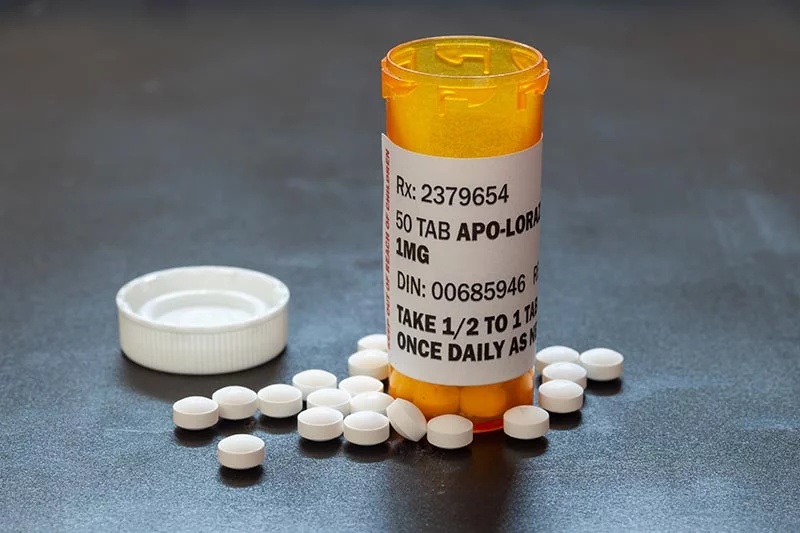Black Market Fuels Benzodiazepine Abuse Surge

Australia has a long history of battling benzodiazepines abuse dating back to the 1970s.
While the government was successful in controlling the supply of the drugs, it ultimately failed in stopping the demand. Regulatory measures only forced the drug trade underground, giving birth to a thriving and lucrative black market.
Today, ‘benzos’ continue to fuel Aussies’ addiction to prescription drugs with no clear end in sight.
What exactly are benzodiazepines and how can they affect workers’ health and well-being? Our chief toxicologist Dr Phil Tynan breaks down the history and profile of these psychoactive drugs.

The (unwelcomed) return of an old friend
What are benzodiazepines?
Benzodiazepines (BZOs) are a group of drugs that treat anxiety and insomnia. During the 1950s, doctors used barbiturates to treat patients with anxiety disorders. However, researchers found out that these depressants were highly addictive and fatal in high doses.
In 1960, Swiss pharmaceutical company Roche released the first of its benzodiazepine-class drugs. Compared to barbiturates, benzos proved to be a much safer option at treating anxiety disorders. The discovery helped propel benzodiazepines to prominence. In fact, Valium—a common BZO—became the most prescribed drug in the U.S. by 1968.
Unfortunately, the early enthusiasm for benzodiazepines was somewhat misplaced. Benzodiazepines turned out to be just as addictive to patients as barbiturates. The psychoactive effects remain even for continuous use of 3 to 4 weeks.
Benzo abuse can also result in serious health conditions for users. Unmanaged withdrawal can lead to life threatening crises associated with severe fitting. Meanwhile, mixing BZOs with alcohol or opiates increases the risk of fatal overdoses.
Despite these health risks, benzodiazepine use still has its benefits. Benzos play a legitimate role in helping patients deal with insomnia in the short term. They are also used as potent anti-seizure agents and as treatment options for alcohol withdrawal.
These days, doctors still rely on benzodiazepines to treat patients suffering from panic attacks and generalised anxiety disorders.

Government stops over-prescriptions to curb benzodiazepine addiction
BZO addiction was originally a result of overprescription. The Australian government tried to put a stop to this by enforcing stricter prescribing controls. In 2011, the number of benzodiazepines prescriptions dropped by 24.9% from its peak in 1992.
However, Australians had merely switched from one form of benzodiazepine to another. They traded Valium for Alprazolam, which is more commonly known as Xanax. This led to a doubling in prescription rates from 2000 to 2010.
To combat this, the government named Xanax as a controlled drug. By restricting BZO prescriptions, authorities believed it would help prevent doctors from over-prescribing and onselling the drugs. It would also discourage patients from ‘doctors shopping’, or seeing multiple treatment providers to get medical prescriptions illicitly. The government hoped to stop the diversion of medical BZOs.
At first, these regulatory efforts seemed to have worked. The country saw a noticeable decrease in benzodiazepine use. However, this gave way to a new wave of BZOs hit.
The problem resurfaces with benzo analogues in the black market
Instead of diverting benzos from medical supplies, smugglers have resorted to selling ‘pressed’ versions of the drugs. Pressed BZOs are drugs that were turned into liquid or powder. Drug makers then cut and press these substances into pills and sell them as knockoffs on the streets.
To make matters worse, drug dealers are now selling new analogues of current BZOs. They have nearly-identical drug molecules and mostly similar effects with known benzodiazepines. However, Australian laws do not cover these new benzo analogues.
One example is Flubromazolam, which is an analogue of Valium. This drug is 10 times more potent than Xanax and can cause serious harm to users.
Benzodiazepines abuse in the workplace
Benzodiazepine abuse can often lead to workplace accidents. Workers who use the drugs can experience an 81% post-usage impairment when performing complex tasks, especially spatio-temporal tasks.
Benzo use significantly impairs working memory and limits the ability to pay attention. It also prevents proper risk-assessment since the drugs tend to block a person’s ability to worry.
Urine benzodiazepine test
Urine tests are a more effective way of drug testing for benzodiazepine use than oral fluid tests.
Only a small amount of BZOs make it to oral fluid specimens, causing oral fluid tests to miss the presence of the drugs.
Benzos also have almost the same detection window and impairment period. However, some of the new analogues are more difficult to detect and can only be assayed during a laboratory drug test.
Stopping benzodiazepines abuse may not be as simple as cutting off drug supplies. As long as there’s a significant demand for the drugs, people will find a way to get their benzo fix.
One way to address the issue is by raising awareness on the dangers of BZO dependence. It is recommended that workplaces implement a drug and alcohol education and training program.
By letting people know how benzodiazepines can damage their health, they’ll be more keen on avoiding them.
Learn More
Your workers are the backbone of your business. That’s why it’s important that you’re aware of their health and well-being.
If you suspect anyone in your organisation is suffering from substance abuse, it’s best to act now and intervene. The safety of your employee and the future of your company may depend on it.
For help in conducting drug and alcohol testing at the workplace, contact us today.
